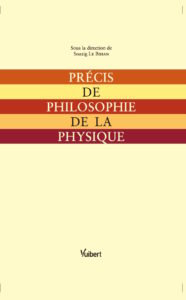I have a rather wide range of research interests. I have been working in the philosophy of physics since my dissertation, in particular on Bell-type theorems and locality. I have also worked on scientific models and the semantic view. I have developed an interest in the philosophy of ecology, in particular on ecological modeling. More recently, I have developed a strong interest in issues surrounding the relationships between science and values.
The research project that is the dearest to my heart (brain) at this moment is the articulation and application of a novel notion of understanding — The Problem and Possibilities View of understanding — which I hope can account for the value of science better than both realist and anti-realist accounts can.
Below is a list of my publications with abstracts and links. You can find my current C.V. at the bottom of the page.
Abstract:
The aim of the paper is to show that understandability is not a basis for choosing between Bohm's theory and the Many-Worlds interpretation of standard quantum mechanics. Advocates on both sides assert that their preferred account is more understandable than the other. On that score, they are both right. The seeming inconsistency involved in this claim is dissolved when one realizes that they employ different notions of understandability. Moreover, understandability, on either notion, is not an overriding criterion of choice between competing accounts if our aim in developing physical theories is truth.
Read More: http://www.worldscientific.com/doi/abs/10.1142/9789814596299_0007
 This book offers, for the first time in France, a panorama of contemporary research in the philosophy of physics. It consists in 16 contributions from internationally reknown specialists in the field: Valia Allori, Guido Bacciagaluppi, Anouk Barberousse, Adrien Baron, Craig Callender, Elena Castellani, Armond Duwell, Michael Esfeld, Doreen Fraser, Roman Frigg, Alexandre Guay, Cyrille Imbert, Vincent Lam, Soazig Le Bihan, Stéphanie Ruphy, and Christian Wütrich.
This book offers, for the first time in France, a panorama of contemporary research in the philosophy of physics. It consists in 16 contributions from internationally reknown specialists in the field: Valia Allori, Guido Bacciagaluppi, Anouk Barberousse, Adrien Baron, Craig Callender, Elena Castellani, Armond Duwell, Michael Esfeld, Doreen Fraser, Roman Frigg, Alexandre Guay, Cyrille Imbert, Vincent Lam, Soazig Le Bihan, Stéphanie Ruphy, and Christian Wütrich.
Among the issues exposed in the book are:
- on quantum physics: locality, decoherence, quantum information, many-worlds interpretations, bohmian interpretations, quantum field theory;
- on thermodynamics and statistical mechanics: Boltzmann's and Gibbs' approaches, reversibility;
- on space-time theory: gauge invariance, quantum gravity;
- plus other issues in the philosophy of physics: computation, classification, symmetries etc.
Preprint: 1-LEBIHAN-Bell
This article deals with the interpretation of quantum correlations and Bell's theorem. It is a rigorous assessment of what can be said about the causal structure underlying Bell-type situation in the light of the current theories of causation (Salmon, Lewis, Woodward).
Preprint: 0-Introduction
This is an introduction to philosophy of physics: how physics can be informed by a philosophical analysis of its methods and concepts, and how philosophy can be informed by the findings of physics concerning the fundamental nature of the universe.
Abstract
In this paper, a modest version of the Semantic View is motivated as both tenable and potentially fruitful for philosophy of science. An analysis is proposed in which the Semantic View is given as characterized by three main claims. For each of these claims, a distinction is made between stronger and more modest interpretations. It is argued that the criticisms recently leveled against the Semantic View hold only under the stronger interpretations of these claims. However, if one only commits to the modest interpretation for all the claims, then the view obtained, which is called the Modest Semantic View, is tenable and fruitful.
This is a commentary on Jean Bricmont's text, in which he defends the Bohmian interpretation of quantum mechanics. The argument in the commentary is that there is underdetermination when it comes to choose between the many-worlds interpretation and the Bohmian interpretation.
Abstract
Since he proved his theorem in 1982, Fine has been challenging the traditional interpretation of the experimental violation of the Bell Inequalities (BI). A natural interpretation of Fine's theorem is that it provides us with an alternative set of assumptions on which to place blame for the failure of the BI, and opens to a new interpretation of the violation of the BI. Fine has a stronger interpretation for his theorem. He claims that his result undermines the traditional interpretation in terms of local realism. The aim of this paper is to understand and to assess Fine's claim. We distinguish three different strategies that Fine uses in order to support his view. We show that none of these strategies is successful. Fine fails to prove that local realism is not at stake in the violation of the BI by quantum phenomena.
A critical review of Johansson's book.
This article expose the fundamental tenets of the semantic conception of scientific theories.
Abstract
It so happens that classical physical theories can be interpreted as a representation of local interactions between systems with determinate properties. Orthodox quantum mechanics, which is one of our most experimentally well-confirmed theories, is notoriously resistant to being interpreted in terms of the above framework. Bell-type theorems and Bell-type experiments have made such an interpretation impossible. In the early sixties, John Bell demonstrated that any theory that represents its domain in terms of the above framework satisfies a set of inequalities, the so-called Bell inequalities. Experiments on quantum phenomena violate Bell-type inequalities. By a simple modus tollens, the upshot is that no theory that includes all the elements of the above framework can recover all statistical predictions of quantum mechanics. Philosophers have been trying to interpret this result, that is, to understand what the world might be like if it is true that physical interactions between systems are non-local, or that physical systems do not possess determinate properties. This line of thought found its climax in program of Òexperimental metaphysicsÓ that developed after the violation of Bell-type inequalities was observed. Experimental metaphysics consists in deriving metaphysical conclusions from the Bell-type experimental results. The mainstream interpretation within experimental metaphysics is that Bell-type experiments force us to accept the existence of a form of non-locality at the ontological level, but a form that we can consider benign because it is of a non-causal type. In my dissertation, I assess to what extent philosophical investigation can help us decide what the world is like on the basis of our best physical theories, from the point of view of the quantum domain and with an emphasis on Bell-type phenomena. My conclusions point to a more modest view on the possible achievements of philosophy of physics than the experimental metaphysics program would have us believe. In the first part of my dissertation, I investigate what role philosophy of physics can legitimately hope to play in the development and evaluation of various accounts of quantum phenomena. I claim that it is not the role of philosophy of physics to impose criteria of acceptability on physical theories, in addition to coherence and empirical adequacy. By contrast, I take in my dissertation that the legitimate role of philosophy of physics is to clearly determine what is imposed by the phenomena and our best theories from what is a matter of preference on the basis of the structural analysis of the phenomena and theories. In the second part of my dissertation, I turn to the more specific case of the interpretation of Bell-type theorems and Bell-type phenomena. I undertake a systematic examination of the mainstream interpretation. I show that the mainstream interpretation includes three claims, one about locality, another one about causation and a last one about holism. I utilize theories of locality and causation in order to assess these three claims. On the one hand, the upshot of my analysis is that the claim about locality can be supported by a rigorous theory of locality. On the other hand, no theory of probabilistic causation can support the claims of the mainstream interpretation about causation when it is construed as a strong program of experimental metaphysics yielding conclusions about the ontology of the world. That said, weakened versions of the mainstream interpretation, those that do without conclusions about the ontology of the world, can be made compatible with some theories of probabilistic causation. In particular, the mainstream interpretation can be rigorously supported if its claims are restricted to the empirical level.
This is a critical comment I gave to Hervé Zwirn paper on the interpretation of quantum mechanics.
This is an article in which I expose the historical roots of the semantic view of scientific theories.
